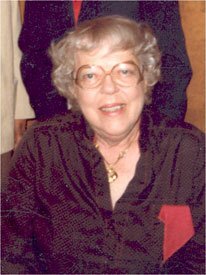Katharyn Duff
Journalist, BA 1936
 Katharyn Duff was born April 9, 1915, at Rusk in East Texas and moved at the age of four to Sylvester, where her father was a banker. She entered Hardin-Simmons University during the Depression, working hard throughout her years at college. She graduated from HSU in 1936.
Katharyn Duff was born April 9, 1915, at Rusk in East Texas and moved at the age of four to Sylvester, where her father was a banker. She entered Hardin-Simmons University during the Depression, working hard throughout her years at college. She graduated from HSU in 1936.
After graduation, Katharyn taught school at Rotan, Fort Stockton, and Abilene High before joining the staff of the Abilene Reporter-News in 1943, where she remained for 37 years. She worked every reporter’s beat in the city, mastered the wire editor’s job, and functioned at various times as acting city editor and acting woman’s editor. She was named assistant editor in March, 1957.
Katharyn became known as a hard-nosed reporter and enjoyed political reporting. But it was her good-humored approach to sharing the happenings of the Big Country—a region she helped name through a contest she oversaw—that brought her most acclaim. This was through her “Page One” column which ran from 1961 to her retirement in 1979.
She covered several sessions of the Texas Legislature, the 1960 and 1968 Democratic National Conventions, and in 1960, she traveled over much of the nation with vice presidential nominee Lyndon Johnson.
She won numerous awards for her work in Texas Associated Press contests, including first in Women’s Department writing in 1954 and first in news feature writing in 1949. One of her top professional honors came in 1961 when she received the Thomas L. Stokes Award for the greatest contribution to conservation of natural resources in the nation that year.
In 1969, Katharyn was awarded by Hardin-Simmons the John J. Keeter Alumni Service Award, the highest honor bestowed upon an HSU alumnus. And in 1976, she was awarded an Honorary Doctor of Letters degree.
Katharyn authored several books, most notably Abilene . . . on Catclaw Creek, which she described as an “informal history of the town.”
Katharyn Duff died July 18, 1995 at the age of 80. Frank Oliver of Dallas penned these words upon her death: “In the world of the printed word, few achieved the status, and affection, of Katharyn Duff. When she spoke, all Texas listened. . . . Her typewriter may be stilled but her voice will resound as long as there is a West Texas.”



